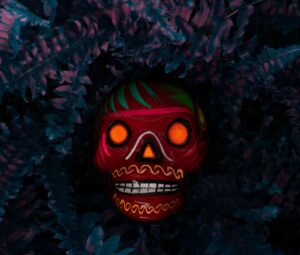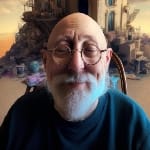PART I: MUST THERE BE HORROR?
The news report gave me a comforting buzz of confirmation and allowed me a rare moment of self-congratulatory public, crowing about my love for the Horror Genre.
It was September 2020 and everyone was only just starting to come to grips with the pandemic that had already taken over a million lives worldwide, when the news dropped that researchers at the University of Chicago had confirmed that avid fans of the Horror Genre were less likely to succumb to extreme bouts of anxiety, depression and insomnia, during the global health crisis that had spread from China to the world in a matter of weeks (Hawthorn).
Here was social science built upon statistical analysis of hardcore data coming to the rescue of all those overgrown kids who had been sent supperless to their rooms after their mothers had found the glossy paged, full-color copies of Fangoria, Rue Morgue, or Weird Tales magazines that had been secretly kept beneath mattresses to avoid parental distress. “You just wait until your father comes home and finds that you’ve been reading this filth, Young Man! Famous Monsters of Filmland? I’ll let him decide your punishment!”
And now, as people sought to muddle through the crisis by crumbling into fits of binge watching or defiantly and irresponsibly gathering maskless for protest rallies in public spaces, here was the perfect proof that Horror geeks among us were turning out to be best suited for the slings and arrows of outrageous fortune. This was their moment to shine, albeit darkly. This was my moment.
The social scientists were saying that, “if you were someone who eagerly sought those deep dives into the murkier side of the entertainment pool where the morbidly curious like to float — we all float down here — then you were more likely to have greater psychological resilience during the pandemic.” Even better for me, as a rabid consumer of the zombie narrative in film and fiction, those the study identified as “fans of prepper genres”, were also likely to be more informed and better prepared for the hard times that accompany major societal crisis like pandemics or natural disasters (Scrivner et al., 2020).
There it was: confirmation and justification. I could, with pride, advocate for both the professional academic study and the private consumption of the Horror Genre in fiction and film. And that’s why this occasional column is here, its purpose being to introduce, to interrogate, to advocate, and to explain the genre as an art form that has much to offer, well, to everyone.
There is an anxious degree of delight and trepidation that accompanies the public advocacy of a genre that has until relatively recently been at best, a curiosity and at worst, a shamefully guilty pleasure in the eyes of academics, reviewers, editors, and critics. Today, we can recognize a greater degree of acceptance from those professionals who until as recently as 25 years ago, might have looked askance at you, when you identified yourself as a scholar, writer, consumer, and fan of Horror or any of those “Horror adjacent” genres like Science Fiction, Fantasy and “Weird Fiction” — all of which can be found huddled together beneath the sheltering umbrella of “Speculative Fiction.”
Things have improved, I believe. Just as those born after the late 1990s might find it hard to imagine how human society functioned without cellphones. Younger generations of academics and professional critics might have difficulty believing that the esteemed gate keepers within academia might have once frowned upon any scholar seeking career promotion with a book of scholarship on… *gulp*… popular Horror fiction. Anyone with an intellectual respect for the spectral or supernatural, for example, would more likely have tried to advance within the academia by remaining within the established boundaries of Gothic Studies, a category that in part, achieved some degree of respect through its historical relationship to literary Romanticism. These same young scholars might do well to consider that the Departments of Women’s Studies in the United States and Europe can trace their official “acceptance” only as far back as the 1970s, a mere decade behind the genesis of Cultural Studies, as it spread from the University of Birmingham to colleges worldwide. Perhaps, the current field of Horror Studies owes a deep debt of gratitude to the giants of Cultural Studies, who made it cool to analyze works from the popular culture industry.
We like to believe that we are living in more “advanced” times, but are we really? I personally recall an afternoon, sometime around the mid-2000s when my host, a successful American scholar, snorted in ridicule when he saw that among the pile of “Ethnic Studies” texts, I had purchased from his university’s bookstore, was a book examining theology in Star Trek. He could not help himself, apparently. As a relatively new scholar of literary studies, holding a doctorate diploma still wet with ink, I was embarrassed. Sometime later, I presented a paper that argued that the popular Science Fiction television show had served as a site of philosophical debate, and the academics attending the conference reacted respectfully. At least they did not snort with barely repressed mockery.
If Science Fiction was still struggling for complete academic respect just 15 years ago, is it unimaginable that scholars in the still-growing field of Horror Studies might at least occasionally experience some uncomfortably expressed disrespect?
And perhaps, that is where we can make the claim for finding value in this column, as a “body without organs” of sorts, an organism of questionable “organization”, offered by a pseudonymously identified writer whose “liminality” is pretty much his best claim to legitimacy as a contributor to a publication newly starting in India, that sees translation as an endeavor, necessary for the revelation of life-shaping potentialities at the heart of all works of Art.
Is it right to say “all works of Art?” I am just going to leave that thought right here so it may set its hooks in your unconscious, and avoid the controversy — for now, for now — that may follow my suggestion that “quality” might be the thing that separates the merely consumable creation from the life-enhancing work of “Art.” Moving on …
I claim liminality for myself because of what feels like a lifetime of being in between, of being both and neither. As a retired academic, I am no longer an academic. And yet I am. As a man in his 60s I am old, but not elderly. And yet I am. As someone who grew up in the impoverishment of the East Coast working class, I claim familiarity with the struggles of the under-privileged, but I am not under-privileged. And yet I am. As an American, who has spent most of his adult life living in Taiwan, I am a naturalized citizen of this state, but not Taiwanese. And yet I am. I find I am no longer comfortable claiming my identity as an American. And yet I am. Here I am, torn between cultures, communities, purposes, meanings. I feel distressingly yet elatedly interstitial.
That liminal state of mind extends to my advocacy of the Horror Genre. It has not been many years since I was comfortable in telling other academics that I wanted to focus on Horror Studies, or even tell people in casual conversations of my fascination with the Horror Genre. And yet I have lived my life loving horror, albeit from afar. Yes, some people still react to my enthusiasm for “scary movies” with exaggerated shock and barely suppress the urge to pat me on the head and say, “There, there,” as if I were a child, complaining about the unfairness of parental discipline.
My love for the genre might be lifelong, but the way academia functions in reality, meant that for much of my career within the “English Department” I could not fully devote myself to an immersion in Horror Studies. I set that professional interest aside and pursued more “acceptable” topics of scholarship within the boundaries of Cultural Studies or American Studies. By the time I was able to publish more openly on Horror texts using the then-contemporary theoretical approaches at the foundation of contemporary literary criticism, I had already begun to feel drained. So, I retired.
Now, having created for myself a “new identity” as Grandfather Hu — a name chosen from the identity of my narrator-character in a langue-teaching radio program, I once helped produce — I can begin from outside the academy, the adventure of publicly re-embracing a form I have always admired. This is my renewal.
The topics of this column may be wildly unorganized, so I drop here the Deleuzian idea of a “body without organs.” But at the heart of everything, I might say about trends and texts is the firm dedication to the Horror Genre — indeed the larger field of Speculative Fiction that includes other fantastic genres — as a creative form of extraordinary importance. I believe that many works of fiction and film within the Horror Genre contain tremendous sociopolitical relevance. It is also my heartfelt conviction that of all the possible genre texts, Horror can offer us some of the most brutally honest philosophical ponderings, portrayals, and revelations of what it means to be human.
This column is a completely new adventure for me, an experiment that I want to undertake with all the manic enthusiasm of pop culture’s maddest of mad scientists. I hope I can translate my limitless admiration for the Horror Genre, for Speculative Fiction, into something that can help us grow new cultures of appreciation in the Petri dishes of literature and film. It is also for me, a learning experience, as I am still a relatively new researcher in the field of Horror Studies. I cannot predict the outcomes of these experiments in our study of the genre, but I can hypothesize that we will achieve some fascinating insights into culture and Art that can translate into visions of the human experience. So, welcome to the laboratory.
Hand me that beaker, and let’s begin.
Shall we?
Citations
Scrivner, et al. “Pandemic Practice: Horror Fans and Morbidly Curious Individuals are More Psychologically Resilient During the COVID-19 Pandemic.” Personality and Individual Differences. 168.1: 2021. Published Online 15 September 2020. Science Direct. [https://www.sciencedirect.com/science/article/pii/S0191886920305882?via%3Dihub] Accessed 27 March 2023.
Ainsley Hawthorn, Ainsley. “Horror Fans Cope Better with the Pandemic, Study Finds.” Psychology Today. 30 September 2020. Online. [https://www.psychologytoday.com/us/blog/the-sensory-revolution/202009/horror-fans-cope-better-the-pandemic-study-finds] Accessed 27 March 2023.
Also, read four Macedonian poems by Lidija Dimkovska, translated into English by Ljubica Arsovska and Patricia Marsh, and published in The Antonym:
Follow The Antonym’s Facebook page and Instagram account for more content and exciting updates.



























0 Comments